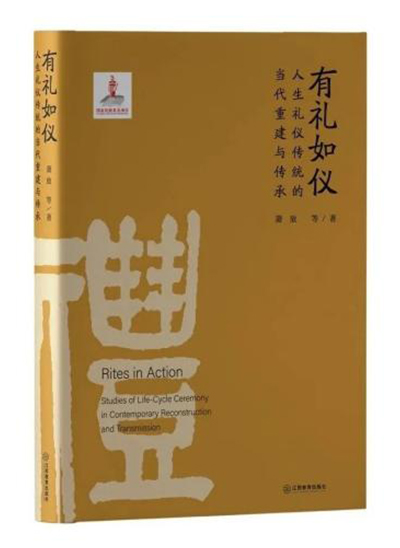Contemporary reconstruction of life ritual traditions

Rites in Action: Studies of Life-Cycle Ceremony in Contemporary Reconstruction and Transmission
The rituals associated with key rites of passage in an individual’s life include birth rites, coming-of-age ceremonies, weddings, funerals, and sacrificial rites. The historical traditions, cultural knowledge, and ritual processes, such as ritual objects, attire, spatial arrangements, and roles, carry rich implications. Rites in Action: Studies of Life-Cycle Ceremony in Contemporary Reconstruction and Transmission, by Xiao Fang, a professor from the School of Sociology at Beijing Normal University, among others, explores the life ritual traditions of China, providing a detailed analysis of life ritual practices in various historical periods and a systematic study of traditional literature.
The book offers insightful observations of scholars caught in the process of transitioning from traditional to contemporary academic paradigms, particularly their contradictory attitudes toward ritual. “Scholars in the midst of transforming from traditional to modern learning experienced the pains of cultural change both physically and mentally. On the one hand, they strove to break through traditional Chinese learning approaches under the influence of modern Western academic thought and systems. On the other hand, they were committed to carrying the realistic concern of seeking a way out for Chinese civilization in their academic research.”
As a result, these scholars display a range of conflicting evaluations of ritual, sometimes even shifting to opposing extremes. For instance, in the view of Wu Yu, traditional rituals are seen as emblematic of the old society and old morals. Liang Qichao, on the other hand, regarded the rule of rites as the foundation of Chinese society, contrasting it with the Western emphasis on rule of law. Qian Mu expressed his admiration for traditional Chinese wisdom, believing that China’s future must be built on its traditions, emphasizing that “to understand Chinese culture, one must view it from a higher vantage point, seeing the heart of China. The core thought of China is ‘ritual.’” In From the Soil: The Foundations of Chinese Society, Fei Xiaotong explicitly proposed the idea of “rule of ritual,” asserting that rituals were the accepted norm of behavior in Chinese society. In Fei’s view, rural society was ruled by rituals, which played a crucial role in maintaining traditional social order and constituted a basic feature of traditional Chinese society.
For these scholars, rituals were seen as the central axis for constructing national ideology, having a structural correspondence with Chinese social forms. However, the immediate concerns of national survival often precluded more nuanced analyses. This sometimes led to a broad, undifferentiated treatment of various aspects of tradition related to ritual, such as ritual systems, rule of rites, ritual ceremonies, ritual significance, ritual connotations, and rituals and customs, without distinguishing between their different discursive forms, social realities, and political uses, as well as their social resilience. In this regard, Xiao’s team makes a valuable academic contribution by focusing on the reconstruction of life ritual traditions.
Zhang Shishan is a professor from the Advanced Institute for Confucian Studies at Shandong University.
Edited by YANG LANLAN

 PRINT
PRINT CLOSE
CLOSE